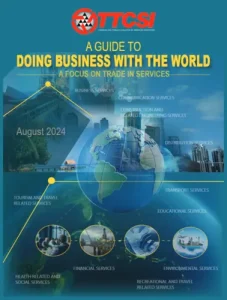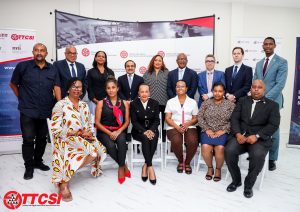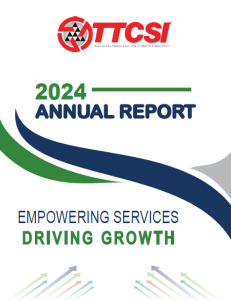Hon. Baldwin Spencer, Prime Minister of Antigua and Barbuda
Mr. Colin Murdoch, Permanent Secretary, Ministry of Foreign Affairs and International Trade
Mr. Edwin Carrington, Secretary General, Caribbean Community
Mr. Irwin LaRocque, Assistant Secretary General, Trade and Economic Integration
Ladies and Gentlemen:
One of the most compelling arguments in favour of the CSME is that it should stimulate the growth of regional firms by facilitating the easier flow of goods and services. Chapter 3 of the Revised Treaty provides the legal basis for trade in services in the CSME. This Chapter refers to all four modes, and when it finally comes to fruition is intended to guarantee the free movement of CARICOM service providers as well as the right to establish a business in any CARICOM territory.
I have to say, that the private sector has become increasingly disenchanted with the lethargic pace of CSM implementation. It has been several years since CARICOM began to implement the free movement of persons, yet businesspersons continue to bitterly complain that entry into other CARICOM countries is based on the whim and fancy of immigration officers. It still is easier to enter regional partners under the pretense of vacation than to enter as a service provider. But service providers, especially small businesspersons and individuals unfailingly express great interest in the Service Providers Certificate when that possibility is brought to their attention. This, by the way, could also be a useful approach to financing the growing services coalitions in the region.
The process of attaining a CARICOM Skills Certificate is long and we hear that the process, which is supposed to be uniform, varies from state to state. The question of what happens to the spouse and dependent children of a holder of a skills certificate who chooses to reside in another CARICOM state still remains unresolved. Service providers still have difficulty moving with their equipment from their home territory to another to provide services, facing difficulties both in their home and the receiving territory. In fact, some have even claimed that foreign competitors receive more facilitation than they do. Work on company registration appears to be proceeding but far too slowly. What will happen to the CARICOM Financial Services Agreement?
I could go on. But, I think the point has been made. Businesspersons in the Caribbean generally see the value in the CSME ideal but they also feel that some of the early momentum has been lost. I think it is fair to say that the private sector wants decisive action to be taken and is willing to play its part.
We therefore see this services symposium as the first step towards reversing our history of poor implementation of regional decisions. At the end of this meeting we should leave not only understanding more about the needs of the regional service sectors BUT more importantly, this meeting will, we hope, produce an action plan, with time-bound and measurable targets, These targets must be met if CARICOM hopes to restore the confidence of the business community which has long grown weary of unfulfilled promises.
But, we in the private sector also have to be facilitators of growth. Service suppliers throughout the region complain of difficulty in obtaining financing for business ventures. Generally, our financial institutions in the Caribbean continue to rely on a brick and mortar mentality. Often the most significant asset that service providers have is their intellectual property, an asset that is rarely valued accurately and thus not recognized by financiers. This is a critical issue, unless it is addressed, despite positive strides made in policy, the services sector will never reach its full potential due to the lack of commercial opportunity.
In addition, the recognition and enforcement of intellectual property rights is critical to the development of the services sector and the promotion of innovation in our societies. Trademarks are critical for the branding of services firms, yet there is no central regional agency responsible for the registration of trademarks in the region. Companies have to go from island to island registering trademarks. Copyright is critical to our musicians and cultural service suppliers and to consultants who copyright their work. Indeed the consultants who wrote the papers for this very conference all had their papers copyrighted to protect their intellectual property. Despite the importance of IP rights to our service providers in the region there is uneven recognition of IP rights, ranging from countries that are fully TRIPS compliant to countries that are non-compliant and have minimal IP protection. Put plainly, businesses in the Caribbean need stronger IP protection NOW.
On November 15th 2008, the region signed the Economic Partnership Agreement, the first agreement that region signed that included a full services component. Later, we will hear about the EPA’s provisions in detail. Here again, we call for quick implementation of the EPA and the finalization of the services agreement with the Dominican Republic to give CARICOM service providers the same or better access than European service providers enjoy. We also urge work on mutual recognition to proceed expeditiously and for countries to consider joint promotion strategies and institutions in Europe. As someone reminded me yesterday, !% of the European pie would be a quite tasty morsel for any Caribbean service provider.
I could go on. I have not even spoken of the need to improve services statistics or to support the national services coalitions or to improve regulations in the services sector or to provide opportunities through fair access to the government procurement systems in the region or to improve the opportunities for our graduates to encourage them to stay in the region or to consider ways to create more truly regional services companies. What’s great about this occasion is that there are so many other capable persons who will contribute over the next three days to address these and other issues as well.
In closing, allow me to express gratitude to our host, Prime Minister Baldwin Spencer, who in a real sense made this happen. Prime Minister, we really welcome the commitment that you have shown to the services sector since assuming this regional responsibility and pledge our commitment to this long-awaited and much needed process.
Thank you,
Wednesday, July 15, 2009





